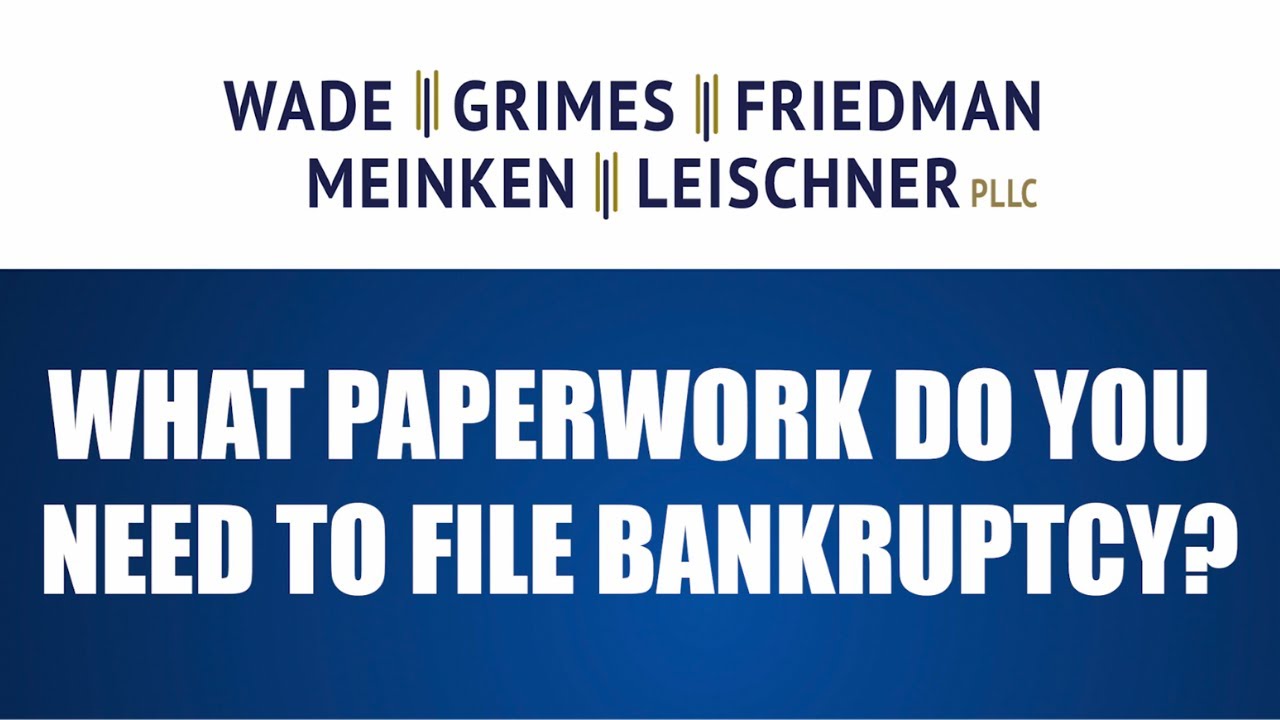5 Essential Documents Needed for Bankruptcy Filing

Embarking on the journey of filing for bankruptcy is a complex and often overwhelming process. However, understanding the essential documentation required can streamline this procedure, providing clarity and direction. This guide delves into the 5 essential documents needed for bankruptcy filing, ensuring that your application is not only well-prepared but also adheres to the legal standards.
Chapter 1: The Bankruptcy Petition

The foundation of your bankruptcy filing is the Bankruptcy Petition. This document initiates the legal process, notifying the court of your intent to declare bankruptcy. Here's what you need to know:
- Form B101: Official Form 101 for Voluntary Petition.
- The name, address, and last four digits of your Social Security Number or EIN.
- Details on whether you've filed for bankruptcy in the last eight years.
- Statement of your financial affairs.
- Exhibits of any court order regarding domestic support or child support.
💡 Note: This petition is the official request to the court for bankruptcy protection, setting the stage for further proceedings.
Chapter 2: Schedules of Assets and Liabilities

These schedules offer a snapshot of your financial situation, allowing the court to assess your assets, debts, income, and expenditures. Here's what to include:
- Schedule A/B: Property, both real and personal.
- Schedule C: Property you claim as exempt.
- Schedule D: Creditors holding secured claims.
- Schedule E/F: Creditors holding unsecured claims.
- Schedule G: Executory contracts and unexpired leases.
- Schedule H: Your codebtors.
Chapter 3: Statement of Financial Affairs

Your Statement of Financial Affairs provides the court with a historical context of your financial activities. Key areas to cover include:
- Income from employment or operations in the last two years.
- Payments to creditors totaling more than $600 within the 90 days before filing.
- Any transfers of property or sales in the last two years.
- Lawsuits, repossessions, foreclosures, garnishments, and setoffs.
- Gifts or charitable contributions made within the past two years.
💡 Note: This statement helps the trustee and creditors understand your financial history, aiding in the fairness of the bankruptcy process.
Chapter 4: Means Test Documentation

The Means Test determines if your income is below the median for your state, influencing whether you can file for Chapter 7 or Chapter 13 bankruptcy. Required documents include:
- Recent paycheck stubs or bank statements.
- Copies of tax returns for the last 6 months or as required by your state.
- Details of your household size, income, and expenses.
- Documentation for any extraordinary expenses or income fluctuations.
Chapter 5: Credit Counseling Certificate

Before you can file for bankruptcy, you must complete a credit counseling course from an approved agency. This certificate serves as proof of compliance:
- Name and address of the agency.
- Date of counseling.
- Counselor’s name.
- Agency's signature.
💡 Note: The credit counseling certificate must be filed along with your bankruptcy petition or within 180 days of filing.
Summary: Preparing for Bankruptcy Filing

Having a clear understanding of the 5 essential documents needed for bankruptcy filing sets you on a path towards a smoother bankruptcy process. By ensuring your Bankruptcy Petition is complete, your schedules of assets and liabilities are meticulously filled, your Statement of Financial Affairs provides a clear history, your Means Test documentation is accurate, and your Credit Counseling Certificate is obtained, you're more likely to navigate this legal procedure with greater confidence and potentially a more favorable outcome. Remember, each document plays a critical role in communicating your financial situation to the court and creditors.
What happens if I don’t include all necessary documents?

+
Your bankruptcy filing could be dismissed, or you might face delays in the process. All documents must be provided to give the court and creditors a complete picture of your financial situation.
Can I file for bankruptcy without a lawyer?

+
Yes, it’s possible to file for bankruptcy without an attorney. However, the process can be complex, and legal advice might help navigate the legal intricacies more effectively.
How long does the bankruptcy process take?

+
The duration varies depending on the type of bankruptcy and case complexity. Chapter 7 can take 3-6 months, while Chapter 13 can take 3-5 years due to the payment plan.
What if my income changes during the Means Test process?

+
If your income changes, you’ll need to provide updated documentation. The court uses the last six months of income for the Means Test, so recent changes can affect your eligibility.
Do I have to attend credit counseling?

+
Yes, bankruptcy law requires debtors to attend credit counseling from an approved agency within 180 days before filing for bankruptcy.